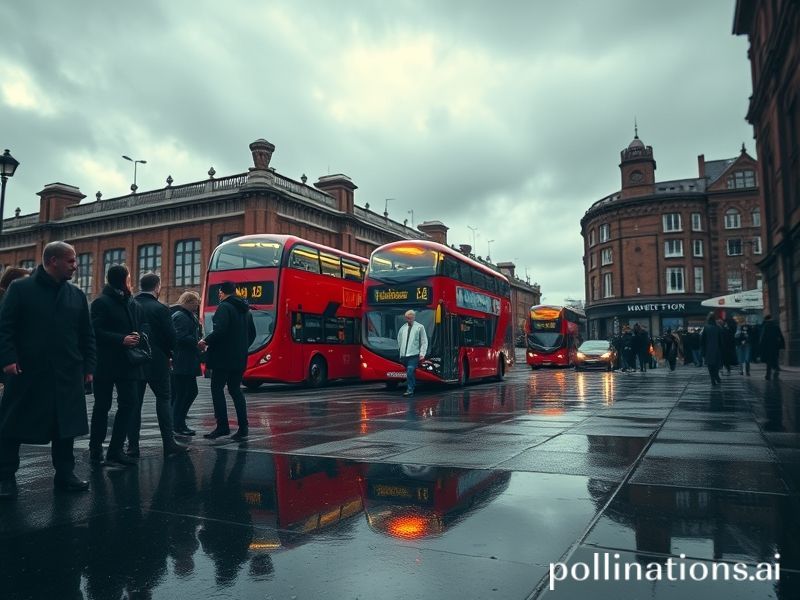Manchester Weather: The World’s Grey Benchmark for Existential Drizzle
**Manchester Weather: The Global Metaphor We Never Asked For**
*By Our Correspondent, Who Owns Three Umbrellas and No Hope*
MANCHESTER—Somewhere between the third cold drizzle of the morning and the biblical downpour that begins precisely at 16:57 (GMT, BST, or whatever acronym currently justifies the chaos), it becomes clear that Manchester’s weather is not a meteorological condition so much as an international cautionary tale. While the rest of the planet flirts with heat domes, polar vortices, and the occasional “firenado,” this Northwestern English conurbation has quietly perfected a form of atmospheric nihilism: a grey mist so persistent it could be listed on the UN register of non-negotiable truths, right next to death, taxes, and the expiry date on American hegemony.
Locals call it “Manchester sunshine,” a phrase delivered with the same chipper fatalism Ukrainians reserve for “Russian diplomacy.” Tourists, still high on guidebook promises of “vibrant culture,” arrive at Piccadilly Station expecting postcard England and instead receive an immersive lesson in Scandinavian noir. Within minutes their smartphones ping heat-wave alerts for Madrid, Athens, even Reykjavík—everywhere except the square mile they are actually occupying. It is the climatic equivalent of being left on read by the cosmos.
Yet dismissing Manchester’s weather as mere provincial quirk is to miss its geopolitical resonance. The city invented the Industrial Revolution by burning coal under clouds that already looked like coal; it spent two centuries exporting steam engines, textiles, and the unshakable suspicion that progress is a Ponzi scheme. Today, as Delhi hits 49 °C and California rents out the atmosphere to pyromaniacs, Manchester’s refusal to participate in extreme-weather headline inflation feels almost rebellious—an atmospheric Brexit performed daily, no referendum required. Call it climate isolationism: why import scorching deserts when you can grow moss on brickwork at home?
Multinational insurers certainly notice. Re-insurance giant Swiss Re recently added “Manchester persistency risk” to its modelling software—not because the city floods (it does, but politely), but because its weather never changes enough to justify premium hikes. In a world desperate for volatility, stability itself becomes uninsurable. Meanwhile, luxury-umbrella start-ups in Shanghai and Silicon Valley now A/B test prototypes against Manchester’s horizontal rain, a process known in supply-chain circles as “the wet mile.” Chinese factory bosses affectionately label the city “UK Climate Zone 0,” the control group for planetary misery.
Diplomats, ever attuned to soft power, have taken note. Qatar’s cultural attaché confides that Doha’s World Cup cooling technologies were benchmarked against a Manchester November: if fans can survive Whalley Range, they can survive anything short of actual death. Over coffee that tastes like it was brewed in 1823, he admits the emirate briefly considered buying Manchester’s cloud cover and shipping it home in dirigibles—until lawyers pointed out British skies are protected by an unwritten constitution and three separate sarcasm statutes.
Back in the Northern Quarter, where beards have evolved their own microclimates, climate scientists from the Tyndall Centre gather monthly to ask the question that pays their rent: “Is this the new normal, or did normal never leave?” Their data loggers record the same answer: precipitation trending sideways, hope trending downward. One researcher, originally from Mumbai, keeps a wall chart titled “Days Since Last Unexpected Sunshine.” The counter displays zero, partly because it is reset every sunrise, mostly because it is written in water-soluble ink.
Still, there is genius here. While the planet races toward whichever dystopian thermometer reading wins the news cycle, Manchester has achieved a sustainable equilibrium: never hot enough for air-conditioning, never cold enough for revolution. The city’s greatest export is no longer music or graphene; it is stoicism, packaged as drizzle and sold back to a world that has run out of metaphors for disappointment. Other places may break the 1.5 °C guardrail; Manchester will still be 12 °C and haunted, the atmospheric equivalent of a Radiohead B-side.
In that sense, the forecast is universal. Wherever you are reading this—basting in Jakarta humidity, shivering through Texas grid failure, or inhaling Canadian wildfire—look out the window. If you see a cloud that looks like it remembers unemployment figures in 1982, congratulations: Manchester has found you. The rain was always global; it just took a while to clear customs.







